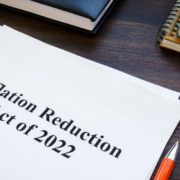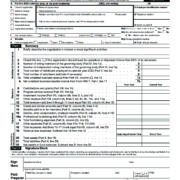How Will Biden’s New Tax Legislation Affect YOUR Finances?
The Inflation Reduction Act was signed into law by President Biden on August 16, 2022. This act is a huge, $750 billion bill that includes provisions to deal with:
- Climate change
- Health care
- Corporate taxes
Below are descriptions of the few provisions that could directly impact your spending and tax bill. There are others, such as the 15% minimum tax on corporations that earn more than 1 billion in profits, and 1% tax on stock buybacks, or expanding the IRS, and thus enforcement capability, but those will unlikely have direct or immediate consequences to your tax bill.
Clean Energy Provisions include:
Extension of the Renewable Energy Tax Credit for Solar and Wind Power for your Home (primary or second home)
The credit is equal to 30% of total cost and installation of solar, wind, and geothermal equipment. The credit was due to expire after 2023. Now it will extend through 2032, with a reduction to 26% through 2034. It’s still a good time to Go Green!
The Energy Efficient Home Improvement Credit
This is similar to the 10% Nonbusiness Energy Property Credit, which was due to expire in 2021, and carried a lifetime maximum of $500. These rules will be extended through 2022, but starting in 2023, the credit will equal the costs of 30% of eligible energy-efficient home improvements, and the $500-lifetime credit limit will become a $1,200 annual credit limit. So if you are considering energy-efficient improvements, it’s probably best to hold off until next year.
Extension of the Electric Vehicle Tax Credit
This $7,500 tax credit is available through 2032 for the purchase of new “eligible” vehicles by “eligible” taxpayers. An eligible vehicle must be manufactured in the U.S. and have a manufacturer’s suggested retail price of less than $55,000 for sedans or less than $80,00 for trucks and SUVs. Unfortunately, this is very restrictive as there are few vehicles that fall within these price ranges. An eligible taxpayer must have a modified adjusted gross income of $150,00 or less for Single filers and $300,00 or less for Married Filing Joint (and $225,000 or less for Head of Household).
New $4,000 Tax Credit for the Purchase of an Eligible Used Electric Vehicle
An eligible vehicle would need to be at least 2 model years old. The credit is 30% of the vehicle’s price up to $4,000 (whichever is less). It has the same taxpayer income limits as the new vehicle credit.
Healthcare provisions include:
Extension of the Affordable Care Act (ACA)
These subsidies were scheduled to expire in 2022; however, they will now go through until 2025. These are subsidies for individuals buying their own health insurance through the ACA “Marketplace.” These extended subsidies should keep the taxpayer’s premiums at rates similar to their 2021 premiums. Without these subsidies, rates would have likely increased significantly due to inflation and other post-COVID factors.
Lower Costs on Some Drugs for Medicare Recipients
The law will cover ten specific drugs starting in 2026, but will expand to cover 20 drugs in 2029. This will occur as the new law allows Medicare to negotiate drug prices. Additionally, out-of-pocket prescription drug costs will be capped to $2,000 per person.
Other Provisions
There are other provisions in this bill that aim to reduce the federal deficit and reduce domestic carbon emissions and other proposals still in negotiations that could have an impact on your taxes in years to come, as well as on the economy as a whole, but for now, I am focusing on the provisions with immediate impact on your finances.










